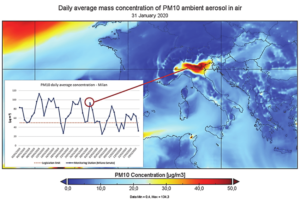Urban-scale tool for air quality assessment
UTAQ, a tool to manage the severe air pollution episodes. Environmental Engineering and Management Journal (2020). Authors: F. Ferrari, G. Maffeis, J. Flemming, R. Gianfreda. DOI: 10.30638/eemj.2020.182.
ABSTRACT
The Urban Tool for Air Quality (UTAQ) is a project funded by CAMS (Copernicus Atmosphere Monitoring Service) – ECMWF (European Centre for Medium-Range Weather Forecasts). UTAQ is a web-based tool with a user-friendly interface that allows users to evaluate current and forecasted air quality for the following 4 days at urban scale with high resolution (10-50 m). UTAQ, in the mobile version, allows citizens to evaluate and then to limit their air quality exposition thanks to the personal position tracking of the mobile device. UTAQ, in the decision makers’ version, allows local authorities to evaluate and find the best traffic limitation strategies to be implemented in the short-term to manage emergency conditions of air quality exceedances. To support this process, UTAQ produces high-resolution maps of air quality both on the current situation and on the forecasted next 4 days. These maps are the combination of:
- the background concentrations supplied by the European CAMS ENSEMBLE model in real time analysis and 4-days forecasts;
- the peak concentration due to traffic through specific hourly source-receptor functions, to make the calculation fast and reliable even at high resolution;
- observed air quality data monitored by urban stations.
UTAQ supports the authorities to increase the degree of awareness of its citizens communicating the air quality forecasts and the benefit obtained thanks to the emission abatement strategies adopted. A first version of UTAQ has been trained and validated on a 10×10 km2 domain close to Monza in Lombardy region, including 7 municipalities (for a total of 180 thousand of inhabitants) with the air monitoring station of Meda (ARPA Lombardia). This work describes an improved version of UTAQ, trained and validated on a domain centered on the metropolitan area of Milan.


